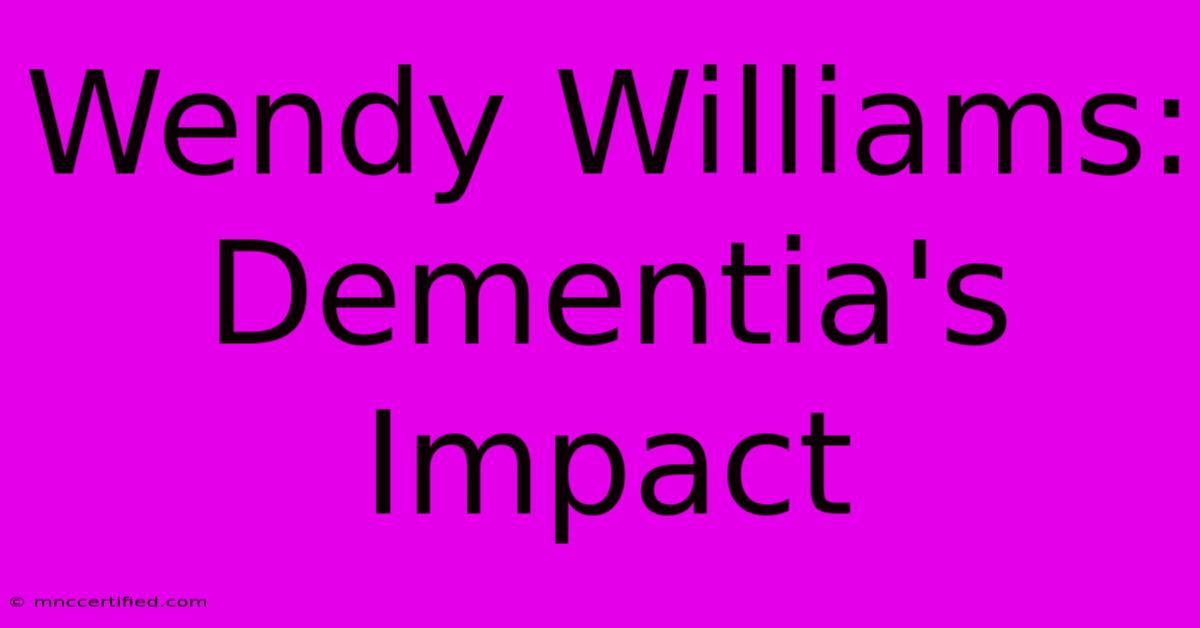Wendy Williams: Dementia's Impact

Table of Contents
Wendy Williams: Dementia's Impact and the Public's Perspective
Wendy Williams, a celebrated television personality known for her outspoken nature and sharp wit, has recently faced significant health challenges, sparking public concern and discussion about the potential impact of dementia. While a formal diagnosis hasn't been publicly confirmed, observed changes in her behavior and cognitive abilities have fueled speculation and raised important questions about dementia, its effects, and how the public perceives individuals facing such conditions.
Understanding Dementia: A Complex Neurological Condition
Dementia is not a single disease but rather an umbrella term encompassing a range of symptoms affecting cognitive functions. These symptoms can include memory loss, difficulty with language, problem-solving, and judgment. The most common cause of dementia is Alzheimer's disease, but other conditions, such as vascular dementia and Lewy body dementia, can also contribute. The progression of dementia varies significantly depending on the underlying cause and the individual's overall health.
Early Signs and Symptoms: Recognizing the Subtle Changes
Early signs of dementia can be subtle and easily overlooked. They might manifest as:
- Increased forgetfulness: Forgetting recent events or conversations.
- Difficulty with familiar tasks: Struggling with everyday activities like cooking or dressing.
- Changes in mood or personality: Becoming more withdrawn, irritable, or anxious.
- Disorientation: Getting lost in familiar places or struggling with time perception.
It's crucial to remember that experiencing one or two of these symptoms doesn't automatically indicate dementia. However, persistent and worsening cognitive decline warrants a thorough medical evaluation.
Wendy Williams' Public Journey and Speculation
Wendy Williams' public appearances and reported behaviors have prompted widespread discussions concerning her potential health struggles. Observers have noted changes in her speech, memory, and overall demeanor, leading to speculation about possible dementia. The lack of official confirmation from her representatives or medical team only fuels public interest and underscores the sensitivity surrounding such diagnoses.
The Importance of Privacy and Respect
It's paramount to approach discussions about Wendy Williams' health with sensitivity and respect for her privacy. Speculation, however well-intentioned, can be harmful and insensitive. Unless information is confirmed by reliable sources, it's crucial to avoid spreading unsubstantiated rumors or engaging in discussions that might contribute to stigmatization.
The Role of the Media in Shaping Public Perception
The media plays a critical role in shaping public understanding of health conditions like dementia. Responsible reporting requires accuracy, sensitivity, and a commitment to avoiding the perpetuation of harmful stereotypes. Focusing on factual information, avoiding sensationalism, and respecting individual privacy are essential elements of ethical reporting on such sensitive topics.
Dementia and the Need for Compassionate Understanding
Regardless of Wendy Williams' specific health status, the situation highlights the importance of fostering a more compassionate and understanding approach towards individuals living with dementia. Dementia is a progressive condition that significantly impacts individuals' lives and the lives of their families and caregivers.
Breaking Down Stigma and Encouraging Support
Dementia often carries a social stigma, leading to isolation and misunderstanding. Open conversations, education, and empathy are crucial in breaking down these barriers and creating supportive environments for those affected. Promoting awareness and understanding can facilitate earlier diagnosis, better care, and improved quality of life for individuals living with dementia and their loved ones.
Conclusion: Navigating Uncertainty and Promoting Understanding
Wendy Williams' situation serves as a poignant reminder of the impact of dementia and the importance of compassion, respect, and responsible reporting. While speculation continues, the focus should remain on raising awareness about this complex condition, combating stigma, and advocating for better support and understanding for those affected by dementia. The ongoing discussions highlight the need for increased public education and a more compassionate approach to neurological illnesses. Let's use this opportunity to learn, empathize, and advocate for a more inclusive society for everyone affected by dementia.

Thank you for visiting our website wich cover about Wendy Williams: Dementia's Impact. We hope the information provided has been useful to you. Feel free to contact us if you have any questions or need further assistance. See you next time and dont miss to bookmark.
Featured Posts
-
Car Insurance Lawrenceville Ga
Nov 27, 2024
-
Bissonnette Fight Suspects Identified By Police
Nov 27, 2024
-
Ernie Johnson Insurance Agency
Nov 27, 2024
-
Coles Opens Up Husbands Death I M A Celebrity
Nov 27, 2024
-
Car Insurance West Jordan Utah
Nov 27, 2024